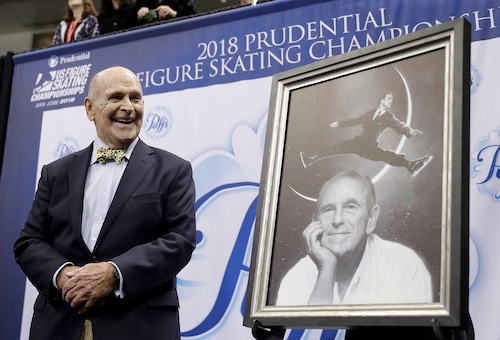By Dave Skretta and Barry Wilner, AP Sports Writers
NEW YORK (AP) The most successful male figure skater in history was Dick Button. He was credited with creating the flying camel spin and explaining it to generations of fans, making him one of his sport’s greatest innovators and advocates.
He was a broadcaster, an entrepreneur, an athlete, and an actor.
According to 1984 Olympic winner Scott Hamilton, Dick was one of the most significant individuals in our sport. No skater who came after Dick wasn’t assisted by him in some way.
Button, who won five straight world titles and two Olympic gold medals, passed away Thursday in North Salem, New York, at the age of 95. Even though Button’s health had been deteriorating, his son Edward confirmed his death without giving a reason.
Figure skating was transformed by the two-time Olympic champion’s innovative style and acclaimed television commentary, according to U.S. Figure Skating. His influence will last forever. We send his family and loved ones our sincerest sympathies.
His passing rocked the tight-knight figure skating world, which was already in shock following the death of all those on board an American Airlines flight and an Army helicopter outside of Washington, D.C., on Wednesday night. The 14 individuals killed were members of the skating community, including two adolescent skaters, their mothers, and two past world champions who were coaching at the Skating Club of Boston, where Button skated and stayed for the remainder of his life.
The Dick Button Artistic Figure Skating Showcase, which aims to highlight the creativity and beauty of skating as an art form, has been held at the Skating Club of Boston, and the trophy room has been named in Button’s honor.
Following World War II, Button’s influence on figure skating started to grow. At the age of 16, he was the youngest champion in his nation and the first American men’s champion when the sport resumed in 1946. He won gold at the St. Moritz Olympics two years later, when the competitions were held outside. He became the first American to win the men’s event and executed the first double axel in any competition, opening the door for other champions like Nathan Chen, Brian Boitano, and Hamilton.
In addition, Button once remarked, “That jump had a cheat on it.” But hear me out: what mattered was that I succeeded.
His dominance of world skating and American amateur sports in general began with that first Olympic title. In 1949, he became the first figure skater to receive the coveted Sullivan Award; no other figure skater did so until 2001, when Michelle Kwan did.
Buttonwon made history by becoming the first person to compete in the triple jump (a loop) and winning a second gold at the 1952 Oslo Games while still a Harvard student. After winning his sixth world title shortly after, he forfeited his amateur status to compete in shows; at the time, all Olympic sports had an amateur-professional category.
Button, who graduated from Harvard Law School in 1956, declared, “As a skater, I had accomplished everything I could have imagined.” It was really important to me that I could continue skating and enjoy the Ice Capades.
As an Emmy Award-winning TV analyst, Button’s candid and frequently brutally honest attitude helped viewers understand not just the fundamentals of a sport that most casual fans aren’t familiar with, but also its subtleties. Like Jim McKay and the unfortunate ski jumper who fell down the slope, he became a mainstay on ABC’s Wide World of Sports.
Boitano, the 1988 Olympic champion, stated in Dick Button’s autobiography that Button is the keeper of figure skating’s history and its most iconic voice. He introduced the terms “lutz” and “salchow” into our common language.
Button convinced ABC Sports executive Roone Arledge to broadcast the 1962 tournament on Wide World following the 1961 plane tragedy that killed the entire U.S. figure skating team en route to the world championships, which were later canceled. He introduced figure skating to a wider television audience at that point when he joined the network as a commentator.
After skaters’ competitive careers ended, Button organized professional events that gave them a way to make money off of their skills. Hamilton, the dance team of Jayne Torvill and Christopher Dean, Kurt Browning, Katarina Witt, and others were given a new stage to perform on thanks to the World Professional Figure Skating Championships, the Challenge of Champions, and other events.
FILE – On January 19, 1948, Dick Button of Englewood, New Jersey, the European and U.S. men’s figure skating champion, does a jump during a practice session in St. Moritz, Switzerland, in advance of the 1948 Winter Olympics. (AP Image, Document)AP
Button even dabbled in acting, appearing in movies and television series including The Bad New Bears Go to Japan and The Young Doctors. Battle of the Network Stars and other made-for-TV shows were produced with assistance from his studio, Candid Productions.
According to three-time U.S. champion and current NBC Sports figure skating analyst Johnny Weir, Dick Button established an honest and open environment in figure skating broadcasting where no subject or moment was off-limits. Even when his viewpoint wasn’t widely held, he was honest. When I performed for him, I couldn’t help but think about his zingers, and I wanted to make him as proud and delighted as I would my instructors.
Weir stated that commentating figure skating has a unique quality. As athletes, we seldom ever get to speak, so we depend on the voices on television to convey our tale. Mr. Button was the only one who could accomplish it.
Dennis Grimaldi, Button’s longtime boyfriend, and his two kids, Emily and Edward, survive him.
From Kansas City, Missouri, Skretta reported.
http://apnews.com/sports is the AP sports website.
More sports news

